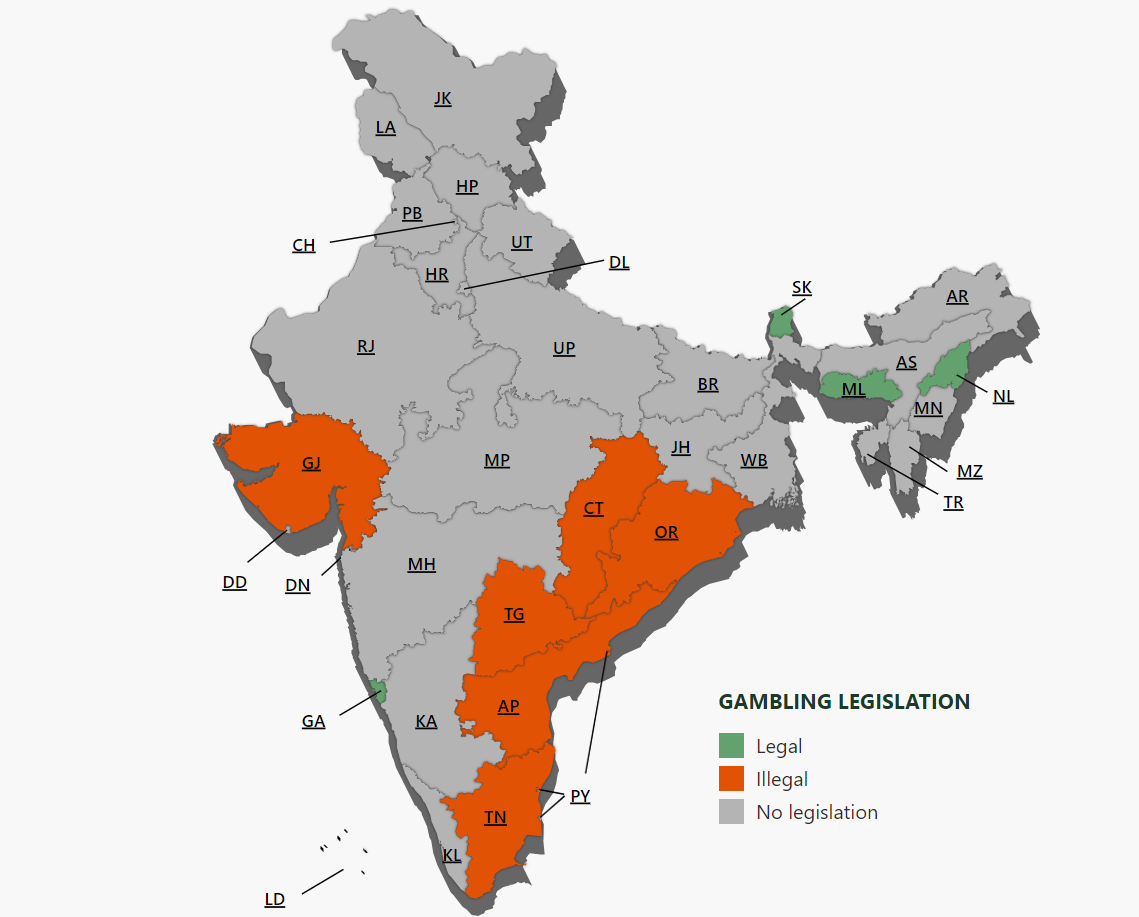Legal Status of Gambling Regulations in India
Gambling has always been a contentious subject in India, with its legality and regulations varying across different states and forms of gambling. Find out the legal intricacies surrounding gambling regulations in India, addressing questions like “Is online gambling legal in India?” and examining various state laws, taxation, and the status of both games of skill and games of chance.
Is Online Gambling Legal in India?
The legal landscape surrounding online gambling in India is complex and often subject to interpretation. While federal law doesn’t explicitly prohibit online gambling, it also doesn’t provide clear regulations for it. Thus, the legality of online gambling largely depends on the interpretation of various state laws.
Just to be clear, no one from India has ever been in trouble with the law (arrested) for playing online casino games on their own, within India.

State Gambling Laws
Each state in India has the authority to formulate its own gambling laws. Some states have enacted legislation that permits certain forms of gambling, while others have strict anti-gambling laws in place. For instance, states like Goa, Sikkim, and Nagaland have legalized certain forms of gambling, including casinos and online betting, under specific regulations and licenses.
ANDHRA PRADESH
Indian states are free to make and regulate their own gambling laws, and the state of Andhra Pradesh has completely forbidden all the gambling related activities whether it is land based or online.
TELANGANA
You cannot play the card game of Online Teen Patti in Telangana as the state has banned all forms of online gaming and gambling through an amendment to The Telangana Gaming Act of 2017.
GUJARAT
In Gujarat, gambling in any form, whether online or offline, is strictly illegal under the Gujarat Prevention of Gambling Act. The state government has taken a firm stance against gambling activities, and there are severe penalties for those caught participating in such activities.
ODISHA
Odisha has outlawed all forms of gambling, making it illegal to gamble either online or offline within the state. The Odisha Prevention of Gambling Act prohibits betting and wagering activities, with strict penalties in place for offenders. The government actively monitors and enforces these laws to uphold public morality and order.
CHHATTISGARH
In Chhattisgarh, gambling is completely illegal, including both online and offline forms. The state government has enacted laws to prevent and punish any gambling activities, aiming to maintain social order and discourage such practices within the state.
TAMIL NADU
Tamil Nadu has stringent laws against gambling, with both online and offline forms prohibited. The Tamil Nadu Gaming Act prohibits any form of betting or wagering, and the state government actively enforces these laws to curb illegal gambling activities.
Experts in Gambling Laws by ProTeenPatti
ProTeenPatti is the go-to spot for all your gambling info. We’ve made special pages explaining the gambling laws for each state and Union Territory in India. Trustworthy sources often mention and use our info. Our team has over decade of experience in the online gaming world, working in well-regulated markets like Sweden, Italy, the US, and others.
Legal Casinos in India
200% Bonus up to ₹1,00,000 + 500 Free Bet
Casino Days have a special weekly feature that you can participate in every weekend! Every user has a chance to win a 10% cashback on any amount lost between Friday and Sunday.
100% Bonus up to ₹1,05,000
Parimatch offers weekly promotions like – Free bets, also you get a chance to win iPods, cars, foreign trips, etc.
100% Cashback up to ₹9,000
MegaPari is known for its competitive odds, live streaming, and more than 300 additional bets on popular events.
What Are the Laws for Gambling in India?
The primary legislation governing gambling in India is the Public Gambling Act of 1867. This colonial-era law prohibits operating or visiting gambling houses, with penalties ranging from fines to imprisonment. However, the law doesn’t specifically address online gambling, leaving room for interpretation and debate.
The Public Gambling Act of 1867
The Public Gambling Act of 1867 was created a long time ago, but it still leaves a lot of uncertainty about gambling laws in India.
This law says that only games where skill is the main factor are considered legal, while games where luck is the main factor are not. It also says that it’s illegal to own, operate, or visit a place where gambling happens.
According to this law, “Any house, walled enclosure, room or place in which cards, dice, tables or other instruments of gaming are kept or used for the profit or gain of the person owning, occupying, using or keeping such house, enclosure, room or place, whether by way of charge for the use of the instruments of gaming, or of the house, enclosure, room or place, or otherwise howsoever.”
Games of Skill vs Game of Chance
Games of skill, such as rummy and poker, have garnered attention in legal circles due to their reliance on skill rather than chance. In several landmark judgments, Indian courts have recognized these games as exempt from gambling laws, provided that they involve a substantial degree of skill.
Contrary to games of skill, games primarily based on chance are subject to stricter regulations. Luck-based games like roulette, slot machines, and traditional Indian card games fall under this category and are often subjected to stringent gambling laws.
Foreign Online Gambling Sites
The proliferation of foreign online gambling sites poses a challenge to Indian authorities. While these sites operate beyond Indian jurisdiction, they are accessible to Indian players. As a result, players often engage in online gambling on these platforms, raising questions about regulation and taxation.
Tax Gambling Laws
Taxation on gambling winnings in India is another aspect that players need to consider. According to Indian tax laws, any income earned from gambling activities is subject to taxation under the Income Tax Act of 1961. However, the enforcement of these laws remains challenging, especially concerning online gambling winnings.
Did You Pay Any Tax on Gambling Winnings?
If you engaged in gambling activities and earned significant winnings, you may be required to report and pay taxes on those earnings. It’s essential to consult with a tax advisor to understand your obligations and ensure compliance with Indian tax laws.
The legal status of gambling regulations in India is a complex endeavor, given the interplay of federal and state laws, as well as the evolving landscape of online gambling. While some forms of gambling are explicitly regulated and permitted in certain states, others remain prohibited or operate in a legal grey area. As the popularity of online gambling continues to rise, policymakers face the challenge of adapting regulations to keep pace with technological advancements while balancing the interests of stakeholders and mitigating potential risks associated with gambling addiction and organized crime. As such, a comprehensive and harmonized approach to gambling regulation is crucial to address the diverse interests and concerns surrounding this contentious issue in India.











